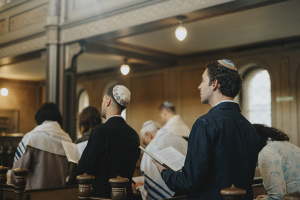The Church Is a Steward of Righteousness

In these days of entrenched political and ideological divisions within the community of believers, it is important to point out who we are as a body called the Church. My heart is burdened for the name of our God and Lord and Savior, Jesus Christ, and for the Church. When we engage, as many of us do, in the marketplace of ideas or social or political causes, as Christians we cannot simply mouth off because we feel we acting out of a sense of righteous indignation. Whether individually or collectively, each believer's conduct reflects upon the Church. It is important to remind each other about what we are called to be and do.
The Church has a unique place in the world. It is a divine entity persisting amidst the corrupt and the morally decaying. Furthermore, it is made up of people who are clothed in mortality and subjected to corruption and moral decay. If we think of the Church, not as an earthbound institution of people sharing a common faith, but as a literal spiritual entity representing a Divine and living God, then it is truly unique in a world where ungodliness and evil rein.
I am concerned that the Church is not embracing its uniqueness. Of all the world's religion, Christianity stands alone in declaring the unmatched and unapproachable goodness of God, who has made himself known to us through Jesus Christ. He alone is God and there is no other - never was, and never will be. It bothers me, then, to see the Church so caught up in the moral depravity that has come to define the age.
Our times are plagued by social strife with disparate special interest groups seeking to be heard and favored. This creates a battlefield where moral virtue becomes the main causality as the means applied are without restraint, and the collateral damage includes truth, decency, civility, compassion, brotherly love, empathy and kindness. Sadly, and especially in America, a significant portion of the Church is engaged in this battle, and is employing the same weapons and means of warfare.
When I speak of the Church I do not make a distinction of denominations, conservative or liberal wings, or para-church factions. The Church consists of wheat and tares, sheep and goats, and at the time of the harvest the Reaper will separate the one from the other. However, I am painfully aware that there are many within the Church who are misguided, sincerely so for the most part, but there are also wolves. Those are "blemishes" that have been allowed free reign to tarnish our good name in these times of moral relativity and uncertainty.
As I have said before, I understand and share the concerns about religious freedom; about the descent of society into the immoral abyss; about the glorying in shame that is embraced by our culture; about the blurring of the sexes and the roles of males and females; and about the fear we have of our children growing up in a world that has been turned upside down morally. I understand. But I also understand that it is how it's going to be in the last days - if I am to take the Bible and its prophetic proclamations as truth.
What then? Well, it is not like we have no alternative but to be like everyone else. There is a word used in scripture that we gloss over without much thought to its significance or to its role in who we are as Christians. Righteousness. At first blush righteousness seems an amorphous word that can mean anything and fit any context so long as the subject pertains to Christianity. As a noun, righteousness defined by Merriam-Webster is "the quality of being right or justifiable." In biblical terms that definition is related to its intended usage.
It is commendable that we are capable of doing right and just things. However, that does not grant us any merit by God. We are only capable of doing right because of the imago dei. The fall of man did not remove every vestige of the sense of right and wrong. However, we often mistake a few right acts as having righteousness. There is the world's righteousness, and there is God's righteousness.
When Jesus taught his disciples to pray, in Matthew 6:10 he said, "Your kingdom come. Your will be done on earth as it is in heaven." And in Hebrews 1:8, "...to the Son He says: Your throne, O God, is forever and ever; a scepter of righteousness is the scepter of [y]our kingdom." God's kingdom is a kingdom of righteousness, and he rules in righteousness. That is what we pray will happen on earth, so it cannot be our righteousness or the world's idea of righteousness.
To have a righteousness that pleases God, it has to be given to us. Jesus advised his disciples to go after God's righteousness in Matthew 6:33a, "But seek first the kingdom of God and His righteousness..." Then Paul explained, "For if, because of one man's trespass, death reigned through that one man, much more will those who receive the abundance of grace and the free gift of righteousness reign in life through the one man Jesus Christ" (Rom 5:17). Righteousness that pleases God is a gift.
This gift of righteousness becomes ours in one sense only - being "new creations" in Christ. It is given to believers so that we can do the good work that God has prepared beforehand for us to do (Ephesians 2:10). Here, righteousness, much like the Grace of God (1 Cor. 15:10; 2 Cor. 6:1), must not be received in vain. It is effectuated in us by the administration of the Holy Spirit, and makes us stewards of righteous.
God's righteousness will define who we are and who we represent. John challenges us in this way: "If you know that He is righteous, you know that everyone who practices righteousness is born of Him" (1 John 2:29), and "He who practices righteousness is righteous, just as He is righteous," "Whoever does not practice righteousness is not of God" (1 John 3:7, 10). God demands unwavering righteousness (Romans 2:1-16). What that means is in whatever we do, we must always be right and justified in the eyes of God, and that it must be recognizable as right in the eyes of the world to his honor and glory.
For the Christian, there can be no moral pragmatism that justifies any act of unrighteousness. Even in moral dilemmas, there is no situation where our God is impotent to deliver his children, and save them (2 Peter 2:9). We in the Church must examine ourselves to see if by our actions, public, private, and within our hearts, we are stewards of righteousness as we are required to be. We cannot accuse others of wrong when we entertain wrong in our private lives and even in our hearts. We cannot call out the vices of some while condoning the same in our lives, or in those we favor.
Otherwise, we will be trampling on his righteousness. And for that we will be called to account. When Paul said in Romans 14:17 "...the kingdom of God is not eating and drinking, but righteousness and peace and joy in the Holy Spirit," He was talking about our conduct that is seen before the world, and how it impacts on others. It is not simply that we believe we have a "righteous" cause, but that we attend that cause in a way acceptable to God, and that it is unmistakable to the world.
Collectively the Church is a steward of righteousness, but is it a good steward? Let's not be judged like the church in Sardis, "These things says He who has the seven Spirits of God and the seven stars: I know your works, that you have a name that you are alive, but you are dead. Be watchful, and strengthen the things which remain, that are ready to die, for I have not found your works perfect before God" (Rev. 3:1-2).
Yes, were are living in the times predicted by our sacred scriptures; a time when ungodliness is ascendant (2 Tim. 3). But we have been equipped by God to be that shining light of righteousness - a light of hope showing the way to escape the darkness. So, "Stand therefore, having fastened on the belt of truth, and having put on the breastplate of righteousness, and, as shoes for your feet, having put on the readiness given by the gospel of peace" (Eph. 6:14-15). That is who we ought to be.




























